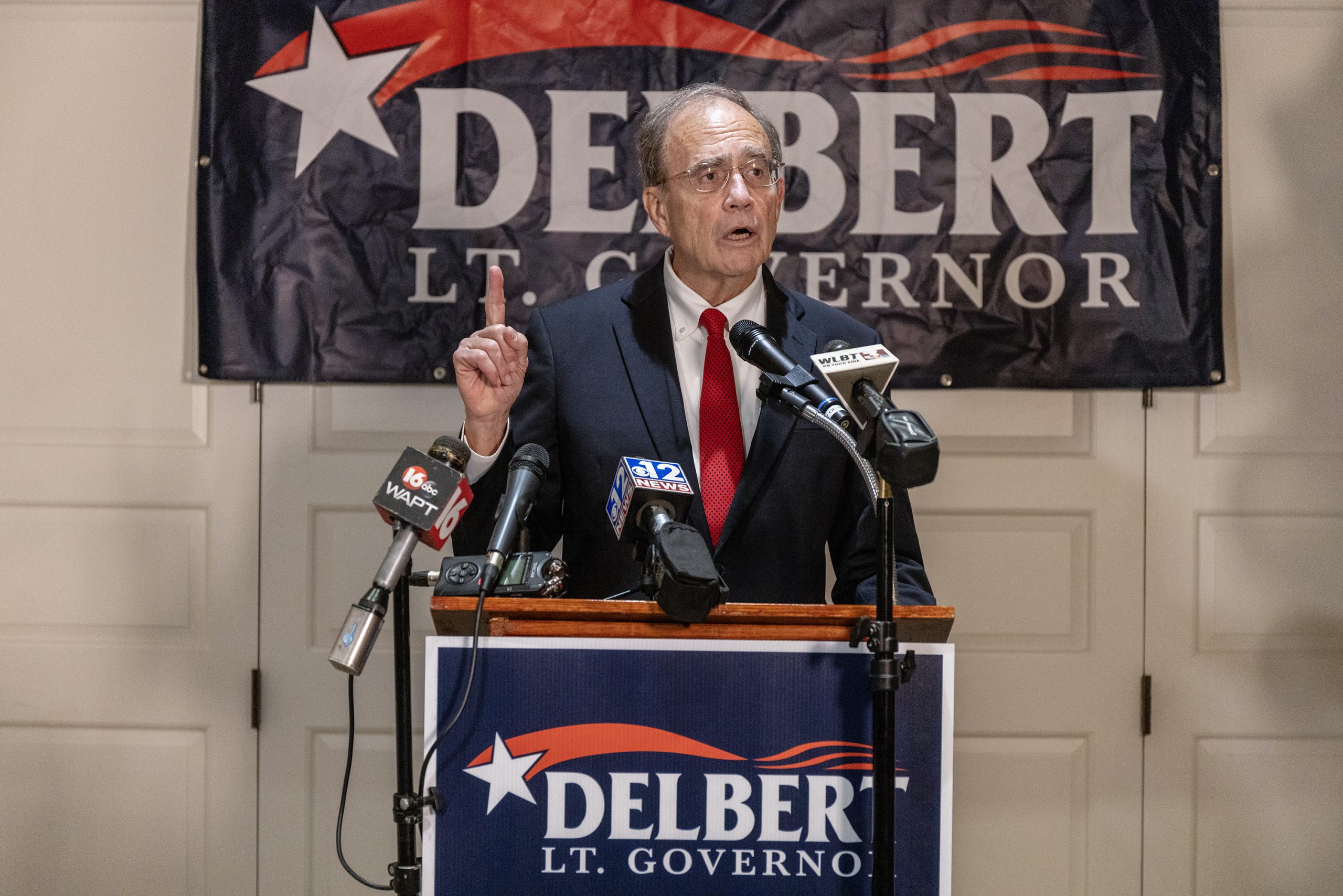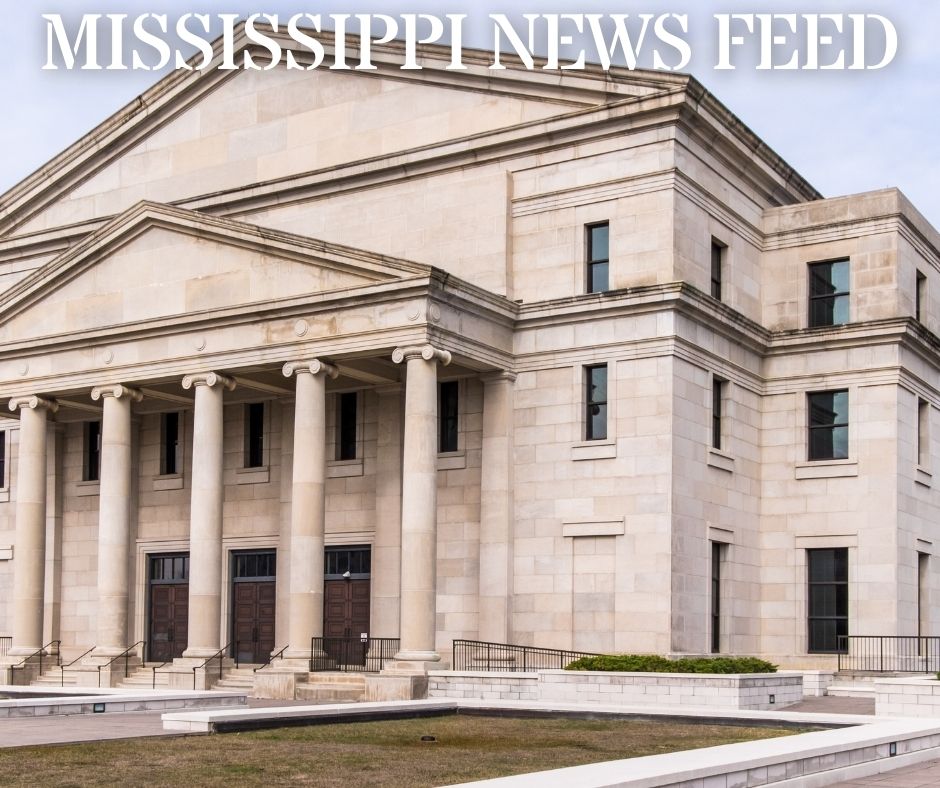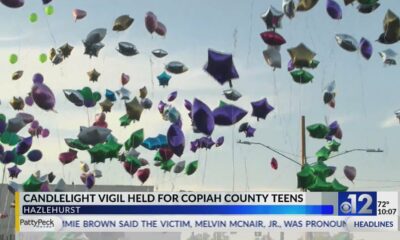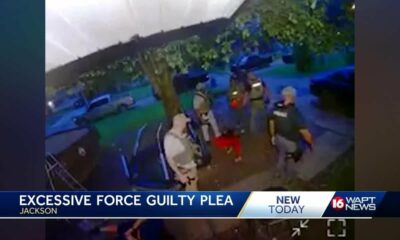Mississippi Today
Campaign finance reform bill gets cold response; lawmakers axe transparency component

Inflamed by lack of investigation or enforcement of what he claimed were flagrant campaign finance violations by his opponent, Lt. Gov. Delbert Hosemann after winning his reelection primary last summer vowed to push for reform.
Secretary of State Michael Watson, who said his hands were legally tied on dealing with such complaints, also vowed to push for reform and more authority for his office to police the flow of money into Mississippi politics.
On Tuesday the Senate Elections Committee moved forward a bill authored by Elections Chairman Jeremy England, R-Vancleave, one of Hosemann's top lieutenants. The “omnibus” bill would give Watson's office more power, add transparency for voters, increase penalties and fines and allow the secretary of state's office to sidestep the AG's office if it refuses to go after bad actors (which has been the current AG's MO).
But lawmakers on both sides of the aisle in the Senate Elections Committee viewed the measure with a gimlet eye. They immediately axed its main transparency component, and added a “reverse repealer” to it, ensuring it cannot be passed into law as is. Only then did they send it along to the full Senate.
Mississippi lawmakers have long been loathe to expose themselves to transparency or strict ethics, lobbying or campaign finance rules and enforcement. The Legislature, for example, exempts itself from the open records and meetings laws it forces on others in government.
Mississippi's campaign finance laws and reporting requirements are lax, and enforcement is nearly nonexistent. These laws have been piecemealed over many years, and the resultant hodgepodge is a confusing, often conflicting set of codes.
Hosemann said he wants an overhaul, and England's bill covered many fronts, including creating a felony crime of perjury for willfully filing false finance reports, and a requirement that Mississippi join the modern age with candidates filing reports electronically and the secretary of state providing a publicly searchable database of campaign finance reports.
“This goes to the heart of the electoral process in this country,” Hosemann said on Monday. “Our founding fathers said the best thing we can have is an informed voter, and to have an informed voter you need to know who's paying for what, who's contributing to these candidates.”
Most other states, including all those surrounding Mississippi, have searchable databases of campaign contributions. For instance, a voter could type in a donor's name and see to whom and how much that donor has given. While Mississippi's SOS office has online campaign finance records, they are non-searchable PDFs — essentially pictures of pages — and candidates are still allowed to file paper, handwritten — even written in crayon — campaign finance reports.
Watson has advocated creating a searchable database, and lawmakers are expected to approve about $5 million in funding for a new SOS computer system. England's bill would have required a searchable database and candidates to file electronically by 2027.
But Sen. Hob Bryan, D-Amory, said requiring Mississippi candidates to use such technology — either filing electronic reports or filling out online report forms — would be too onerous. He said this would prevent those who don't have computers or cannot use them from running for office. He noted many areas of the state still lack high-speed internet service.
Bryan offered a successful amendment to strip the requirement for candidates to file campaign finance reports electronically.
Bryan and others also voiced trepidation about measures in the bill to aid investigation and prosecution of campaign finance violations. The measure, England said, changed a lot of “mays” about investigation and prosecution into “shalls.” It also says the secretary of state's office, after it reports potential violations to the attorney general's office, can hire outside counsel, engage a district attorney or find a special prosecutor if the AG's office refuses to act.
“We are trying to clear up gray areas,” England said. “… so we don't have situations where we don't know who's responsible to do what.”
But Sen. Joey Fillingane, R-Sumrall, said he fears this would amount to “shopping for a prosecutor who's willing to prosecute … almost like fishing for prosecution.”
Bryan said, “I worry we are weaponizing the filing of complaints” against candidates.
After numerous critical questions about the measure, Sen. David Blount, D-Jackson, successfully offered an amendment to add a “reverse repealer” to the bill. This says the bill repeals before it could take effect, meaning it could not be passed into law without further scrutiny and work.
“Our laws can use a tune-up from time to time, but there are a lot of questions on this,” Blount said. “Let's just keep working on this bill.”
England said that despite the rocky start, “I think we'll get something out this year,” even if all the proposed reforms don't make it. As to the searchable campaign finance database like other states have, he said, “I think we will eventually see that added back, just maybe not this year.”
The House this session did not have an omnibus campaign finance reform bill, but had several smaller measures. Most died without a vote in committee with Tuesday's deadline.
New House Speaker Jason White, who in the past has championed some campaign finance reform measures, said he is open to such legislation.
“One specific thing lots of lawmakers are talking about is how we can better enforce the laws we have on the books now,” White said recently. “Also, transparency and searchable information that is easily accessed and available to the public is another potential place we could improve.”
Some highlights of Senate Bill 2575 authored by England:
- It would remove the state Ethics Commission from campaign finance duties. The commission, spartanly staffed and funded, had been given some oversight over campaign finance reports, but the law was unclear on its authority, and conflicted with other laws still on the books. Hosemann said the secretary of state and attorney general offices have more staff, attorneys and expertise to deal with the regulations and laws.
- The bill would increase criminal penalties for willful violations of campaign finance laws from up to $3,000 and six months in jail to up to $5,000 and a year in jail. It would create a felony penalty of perjury for willfully filing false campaign finance reports. It would also increase fines and penalties for administrative violations, such as failing to file campaign finance reports timely.
- It would define coordinated expenditures and electioneering, seeking to prohibit third parties spending to help candidates but claiming they are acting independently and not following contribution limits and cut down on millions in “dark money” that has begun flowing into Mississippi elections.
- Would clearly define corporations and clarify that corporations both in state and out of state are limited to contributions of $1,000 a year. Recently, AG Lynn Fitch said state law is not clear on the definition of a corporation, and she opined that out-of-state corporations don't face the $1,000 limit — contrary to decades of interpretation of Mississippi's law and practice.
- Would require candidates to list the name, address and occupation of a donor. It would also give the secretary of state authority to check reports to make sure they are complete and appear accurate. Under current law, the secretary's office is simply a repository, and has little oversight on whether reports are accurate and complete.
This article first appeared on Mississippi Today and is republished here under a Creative Commons license.
Mississippi Today
On this day in 1950


MAY 16, 1950

Twenty Black families from South Carolina filed the lawsuit, Briggs v. Elliott, the first direct attack on the validity of the “separate but equal” doctrine in public schools.
The litigation was later combined with the successful Brown v. Board of Education case. The litigation might never have happened if not for the Rev. Joseph A. DeLaine, who accepted the NAACP's call to challenge the school bus transportation practices in Clarendon County, where Black students had to walk up to 8 miles to school.
“I realize that the stand that I take may cost me my job as a school teacher, but we need men,” he wrote.
Property owner Levi Pearson had previously sued, asking that school buses be provided for Black students. After his lawsuit failed on technical grounds, Thurgood Marshall approached DeLaine, saying he needed families for litigation, or the NAACP couldn't go any further.
After gathering the signatures of 107 parents and their children, economic pressure and violence followed. Despite this, 17 adults signed the petition again, and the lawsuit moved forward to trial. Evidence showed that South Carolina spent $221 annually for each white student, but only $45 for each Black student. White children had modern schools with a teacher for every grade. Meanwhile, Black children studied in wooden shacks, reading textbooks discarded by white students.
As a result of their activism, the Pearson family saw boycotts of their timber, and the Briggses were fired from their jobs. So were DeLaine and his wife. They saw their home and church burned to the ground. They were forced to leave the state after a drive-by shooting. In 2003, the families of DeLaine, Levi Pearson and the Briggses received Congressional Gold Medals for their courage.
This article first appeared on Mississippi Today and is republished here under a Creative Commons license.
Did you miss our previous article…
https://www.biloxinewsevents.com/?p=358956
Mississippi Today
PSC axes solar programs in light of EPA funds, advocates file lawsuit
Advocates from some of the state's conservation groups — such as Audubon Delta, Mississippi Sierra Club and Steps Coalition — spoke out Wednesday against a recent decision by the Mississippi Public Service Commission to suspend several solar programs, including “Solar for Schools,” less than two years after the previous commission put them in place.
“This is particularly disappointing because the need for these incentives in the state of Mississippi is significant,” said Jonathan Green, executive director of Steps Coalition. “Energy costs in the South, and in particular the region known as the Black Belt, are higher than those in other parts of the country for a number of reasons. These regions tend to have older energy generation infrastructure, and housing that has not been weatherproofed to modern standards. For many low- to moderate-income residents in the state of Mississippi, energy burden and energy insecurity represent real daily economic challenges.”
The PSC voted 2-1 at its April docket meeting to do away with the programs, reasoning in part that new funds through the Inflation Reduction Act would be available to the state. About 10 days later, the Environmental Protection Agency awarded $62 million to the state, through the Hope Enterprise Corporation, to help low-income Mississippians afford adding solar power to their homes. The funds are part of the Biden Administration's Solar for All program, one of the several recent federal initiatives aimed at reducing greenhouse gas emissions.
The PSC decision ended three programs the previous commission put in place to encourage wider adoption of solar power through the two power companies it regulates, Entergy Mississippi and Mississippi Power: “Solar for Schools,” which allowed school districts to essentially build solar panels for free in exchange for tax credits, as well as incentives for low-income customers and battery storage.
Last Friday, the Sierra Club filed lawsuits in chancery courts in Hinds and Harrison counties against the commission, arguing the PSC broke state law by not providing sufficient reasoning or public notice before making the changes. Advocates also argued that new funding going to Hope Enterprise won't go as far without the PSC's low-income incentives.
The programs were part of a 2022 addition to the state's net metering rule, a system that allows homeowners to generate their own solar power and earn credits for excess energy on their electric bills. Mississippi's version is less beneficial to participants than net metering in most states, though, because it doesn't reimburse users at the full retail cost. Mississippi's net metering program itself is still in tact.
Northern District Commissioner Chris Brown said that, while he supported efforts to expand solar power, he didn't think programs that offer incentives from energy companies were fair to other ratepayers.

“It's the subsidy that we take issue with,” Brown said at the meeting. “It's not the solar, it's not the helping the schools. We just don't think it's good policy to spread that to the rest of the ratepayers.”
Brown and Southern District Commissioner Wayne Carr voted to end the programs, while Central District Commissioner De'Keither Stamps voted against the motion. All three are in their first terms on the PSC. Brown's position is in line with what the power companies as well as Gov. Tate Reeves have argued, which is that programs like net metering forces non-participants to subsidize those who participate.
Robert Wiygul, an attorney for the Mississippi Sierra Club, countered that argument during Wednesday's press conference, saying that net metering actually helps non-participants by adding more power to the grid and reducing the strain on the power companies' other infrastructure. Moreover, he said, the PSC hasn't offered actual numbers showing that non-participants are subsidizing the program.
“Look, if the commission wants to talk about that, we are ready to talk about it,” Wiygul said. “But what we got here is a situation where these two commissioners just decided they were going to do this. We don't even know what that claim is really based on because it hasn't been through the public notice and hasn't been through the public comment process.”
While no schools had officially enrolled in “Solar for Schools,” which went into effect in January of last year, Stamps told Mississippi Today that there were places in his district getting ready to participate in the very programs the PSC voted to suspend.

“My issue was we should have talked to the entities that were going through the process to (understand what they were doing) to participate in the programs before you eliminate the programs,” he said.
Several school districts in the state are already using solar panels thanks to funding from a past settlement with Mississippi Power. Officials there told Mississippi Today that the extra power generated from the panels has freed up spending for other educational needs. During the public comment period for the 2022 net metering update, about a dozen school district superintendents from around the state wrote in to support the initiative. Ninety-five school districts in the state would have been eligible for the program because they receive power from Entergy Mississippi or Mississippi Power.
Former commissioner Brent Bailey, who lost a close reelection bid in November to Stamps, was an advocate for the schools program that the PSC created while he was there. At the April docket meeting, he pleaded with the new commission to reconsider, arguing that the new federal funding won't have the same impact without those programs.
“My ask is to at least give this program a chance, see where it goes, and hear from stakeholders that have participated,” Bailey said. The solar programs, he added, weren't just about expanding renewable energy, but taking advantage of a growing economy around solar power as well: “We can just stand by and watch it go by, or we can participate in this and bring economic development to the state.”
This article first appeared on Mississippi Today and is republished here under a Creative Commons license.
Crooked Letter Sports Podcast
Podcast: In or out (of the NCAA Tournament)?

College baseball's regular season is in its last week, which means baseball bracketology is a popular activity. State needs to finish strong to become a Regional host. Southern Miss probably has already punched its ticket as a 2- or 3-seed. Ole Miss, playing its best baseball presently, needs victories, period. Meanwhile, the State High School softball tournament is this week in Hattiesburg, and the state baseball tournament comes to Trustmark Park in Pearl next week.
Stream all episodes here.
This article first appeared on Mississippi Today and is republished here under a Creative Commons license.
Did you miss our previous article…
https://www.biloxinewsevents.com/?p=358148
-
SuperTalk FM3 days ago
Martin Lawrence making 3 stops in Mississippi on comedy tour
-
Our Mississippi Home2 days ago
Beat the Heat with Mississippi’s Best Waterparks
-
Mississippi Today6 days ago
Lawmakers may have to return to Capitol May 14 to override Gov. Tate Reeves’ potential vetoes
-
Mississippi News7 days ago
Man arrested for allegedly breaking into home, robbing owner
-
SuperTalk FM7 days ago
Couple arrested after husband received unemployment benefits while in prison
-
Mississippi News Video5 days ago
Local dentists offer free dental care in Amory
-
Our Mississippi Home3 days ago
Charlie’s U-Pik: Opening Soon for the Summer Season
-
Mississippi News6 days ago
Bond set for West Point couple accused of killing their child





































